主谓一致和就近就远原则
英语主谓一致中 就近原则和就远原则
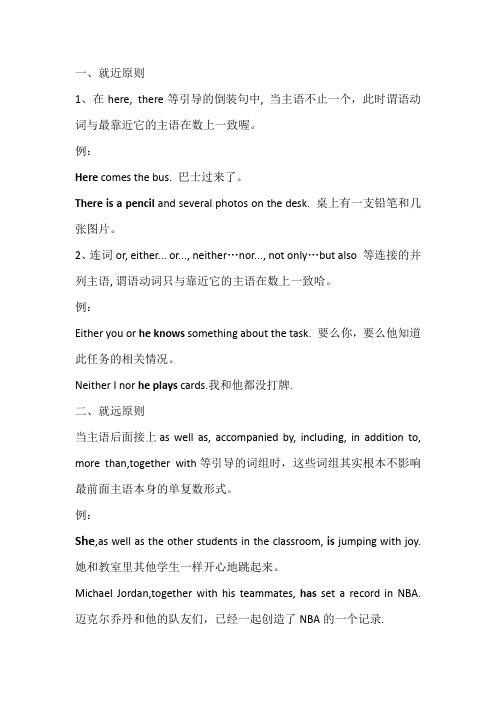
一、就近原则
1、在here, there等引导的倒装句中, 当主语不止一个,此时谓语动词与最靠近它的主语在数上一致喔。
例:
Here comes the bus. 巴士过来了。
There is a pencil and several photos on the desk. 桌上有一支铅笔和几张图片。
2、连词or, either... or..., neither…nor..., not only…but also 等连接的并列主语, 谓语动词只与靠近它的主语在数上一致哈。
例:
Either you or he knows something about the task. 要么你,要么他知道此任务的相关情况。
Neither I nor he plays cards.我和他都没打牌.
二、就远原则
当主语后面接上as well as, accompanied by, including, in addition to, more than,together with等引导的词组时,这些词组其实根本不影响最前面主语本身的单复数形式。
例:
She,as well as the other students in the classroom, is jumping with joy.她和教室里其他学生一样开心地跳起来。
Michael Jordan,together with his teammates,has set a record in NBA. 迈克尔乔丹和他的队友们,已经一起创造了NBA的一个记录.。
高考英语主谓一致
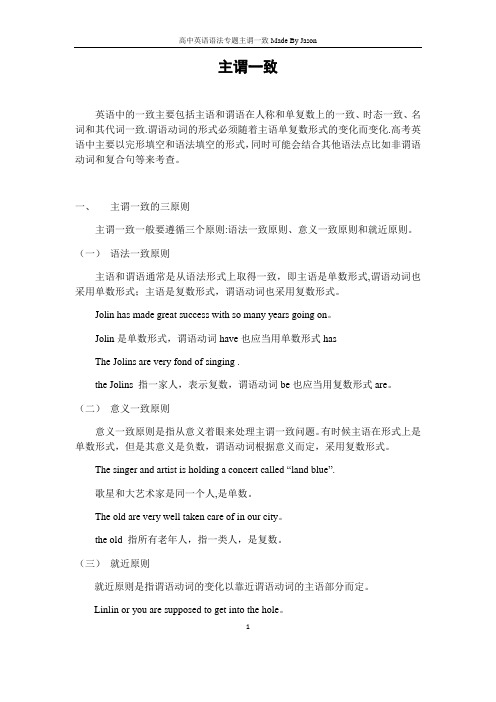
主谓一致英语中的一致主要包括主语和谓语在人称和单复数上的一致、时态一致、名词和其代词一致.谓语动词的形式必须随着主语单复数形式的变化而变化.高考英语中主要以完形填空和语法填空的形式,同时可能会结合其他语法点比如非谓语动词和复合句等来考查。
一、主谓一致的三原则主谓一致一般要遵循三个原则:语法一致原则、意义一致原则和就近原则。
(一)语法一致原则主语和谓语通常是从语法形式上取得一致,即主语是单数形式,谓语动词也采用单数形式;主语是复数形式,谓语动词也采用复数形式。
Jolin has made great success with so many years going on。
Jolin是单数形式,谓语动词have也应当用单数形式hasThe Jolins are very fond of singing .the Jolins 指一家人,表示复数,谓语动词be也应当用复数形式are。
(二)意义一致原则意义一致原则是指从意义着眼来处理主谓一致问题。
有时候主语在形式上是单数形式,但是其意义是负数,谓语动词根据意义而定,采用复数形式。
The singer and artist is holding a concert called “land blue”.歌星和大艺术家是同一个人,是单数。
The old are very well taken care of in our city。
the old 指所有老年人,指一类人,是复数。
(三)就近原则就近原则是指谓语动词的变化以靠近谓语动词的主语部分而定。
Linlin or you are supposed to get into the hole。
1You是最靠近谓语动词的主语部分,因此be动词应当用复数形式的are。
二、主谓一致的详细讲解(一)代词作主语1.不定代词either,neither, each, one,the other,another以及复合不定代词someone,somebody等作主语,谓语动词用单数。
(完整)初中英语主谓一致和就近原则讲解及练习.doc
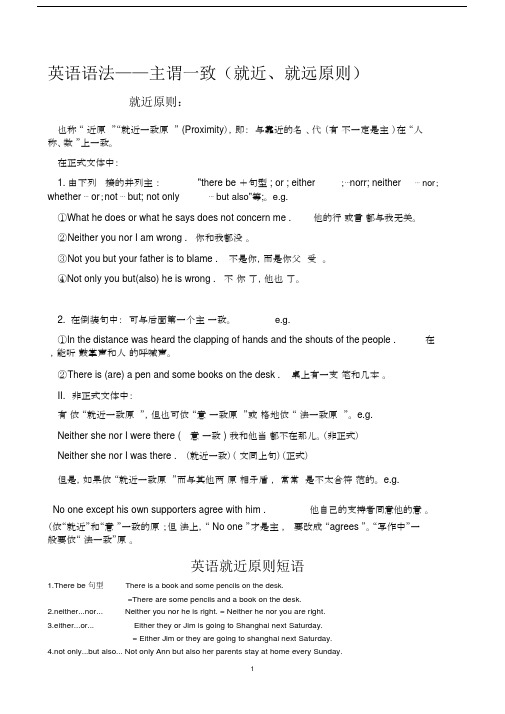
英语语法——主谓一致(就近、就远原则)就近原则:也称“ 近原”“就近一致原” (Proximity),即:与靠近的名、代(有不一定是主)在“人称、数”上一致。
在正式文体中:1. 由下列接的并列主:"there be +句型 ; or ; either;⋯norr; neither⋯nor;whether ⋯ or;not ⋯ but; not only⋯but also"等;。
e.g.①What he does or what he says does not concern me .他的行或言都与我无关。
②N either you nor I am wrong . 你和我都没。
③N ot you but your father is to blame . 不是你,而是你父受。
④Not only you but(also) he is wrong . 不你了,他也了。
2. 在倒装句中:可与后面第一个主一致。
e.g.①In the distance was heard the clapping of hands and the shouts of the people .在,能听鼓掌声和人的呼喊声。
②T here is (are) a pen and some books on the desk . 桌上有一支笔和几本。
II.非正式文体中:有依“就近一致原”,但也可依“意一致原”或格地依“ 法一致原”。
e.g.Neither she nor I were there (意一致)我和他当都不在那儿。
(非正式)Neither she nor I was there .(就近一致)(文同上句)(正式)但是,如果依“就近一致原”而与其他两原相矛盾,常常是不太合符范的。
e.g.No one except his own supporters agree with him .他自己的支持者同意他的意。
主谓一致——就近原则

主谓一致——就近原则.代表词汇:代表词汇:主谓一致现象。
有一类连接词,其后的谓语动词要与连接词前一部分的主语保持一致。
此类连接词有with, along with, together with, as well as, besides, like, without, except (but), including等。
例如:Tracy, like many girls, loves dancing. 特蕾西像很多女孩一样,喜欢跳舞。
All the students, including Tom, are leaving. 所有的学生,包括汤姆都走了。
No one except (but) me knows about this news. 除了我没有人知道这个消息。
就近原则现象。
还有另一类连接词,句中的谓语动词要与靠近的主语保持一致。
此类连接词有or, either... or, neither...nor, not only... but also等。
例如:Neither you nor I am wrong. 你和我都没错。
Not only the students but also the teacher wishes for a holiday. 不仅是学生,就连老师也期盼一个假期。
1.There be 句型There is a book and some pencils on the desk.=There are some pencils and a book on the desk.2.neither...nor... Neither you nor he is right.= Neither he nor you are right.3.either...or... Either they or Jim is going to Shanghai next Saturday.= Either Jim or they are going to shanghai next Saturday.4.not only...but also... Not only Ann but also her parents stay at home every Sunday.= Not only Ann's parents but also she stays at home every Sunday.百度词条:就近原则也称“邻近原则”“就近一致原则”(Proximity),即:谓语与靠近的名词、代词(有时不一定是主语)在“人称、数”上一致。
主谓一致——就近原则-主谓就近一致

主谓一致 就近原则.代表词汇:Neither ....... n orWhether ...... o r ........Not only ...... but also .........bxcep ;besides but ; including;例如:IHe rather than I is right. Nobody but two StUdentS is in the CIaSSrodm.主谓一致现象。
有一类连接词,其后的谓语动词要与连接词前一部分的主语保持一致。
此类连接词有with, along with, together with, as well as, besides, like, without, except (but), including 等。
例如:Tracy, like many girls, loves dancing. 特蕾西像很多女孩一样,喜欢跳舞。
All the students, including Tom, are leaving. 所有的学生,包括汤姆都走了。
No one except (but) me knows about this news. 除了我没有人知道这个消息。
就近原则现象。
还有另一类连接词,句中的谓语动词要与靠近的主语保持一致。
此类连接词有or, either... or, neither...nor, not only... but also 等。
例如:Neither you nor I am wrong. 你和我都没错。
Not only the students but also the teacher wishes for a holiday. 不仅是学生,就连老师也期盼一个假期。
1. There be 句型There is a book and some pencils on the desk.=There are some pencils and a book on the desk.2. neither...nor... Neither you nor he is right.= Neither he nor you are right.3. either...or... Either they or Jim is going to Shanghai next Saturday.= Either Jim or they are going to shanghai next Saturday.4. not only...but also... Not only Ann but also her parents stay at home every Sunday.= Not only Ann's parents but also she stays at home every Sunday.百度词条:就近原则也称邻近原则”就近一致原则”(Proximity),即:谓语与靠近的名词、代词(有时不一定是主语)在人称、数”上一致。
主谓一致和就近就远原则

主谓一致和就近就远原则主谓一致和就近原则是语法中的重要概念,用于确定主语和谓语动词之间的一致关系。
主谓一致指的是主语和谓语动词在人称、数和时态上保持一致;就近原则指的是谓语动词的单复数形式取决于离它最近的主语。
首先,主谓一致是指主语和谓语动词在人称、数和时态上保持一致。
在英语中,一般来说,第三人称单数主语需要用动词的第三人称单数形式,而其他人称和数则使用动词的一般形式。
例如,当主语是第三人称单数时,谓语动词要加s或es,如he goes,she thinks。
而当主语是第一人称单数或复数,第二人称单数或复数时,谓语动词则保持一般形式,如I go,we think,you study。
其次,就近原则指的是谓语动词的单复数形式取决于离它最近的主语。
在一个句子中,如果存在多个主语,谓语动词的单复数形式要根据最近的主语决定。
例如,句子“Tom and his friends are going to the party”中,谓语动词are是根据最近的主语Tom决定的,而不是前面的friends。
而在句子“His friends and Tom is going to the party”中,谓语动词is则是根据最近的主语Tom决定的,而不是前面的friends。
主谓一致和就近原则在句子中起到了重要作用,确保了语法的正确性和语言的连贯性。
下面将分别对主谓一致和就近原则进行具体说明。
主谓一致的几个注意事项:1.主谓一致在人称上的一致性,即主语和谓语动词要在人称上保持一致。
例如,当主语是第三人称单数时,谓语动词要用第三人称单数形式;当主语是第一人称单数或复数时,谓语动词要用一般形式;当主语是第二人称单数或复数时,谓语动词要用一般形式。
例如:- She goes to school every day.(第三人称单数,谓语动词用第三人称单数形式)- They go to school every day.(第三人称复数,谓语动词用一般形式)- I go to school every day.(第一人称单数,谓语动词用一般形式)- We go to school every day.(第一人称复数,谓语动词用一般形式)- You go to school every day.(第二人称单数或复数,谓语动词用一般形式)2.主谓一致在数上的一致性,即主语和谓语动词要在数上保持一致。
主谓一致——就近原则

主谓一致——就近原则.代表词汇:代表词汇:主谓一致现象。
有一类连接词,其后的谓语动词要与连接词前一部分的主语保持一致。
此类连接词有with, along with, together with, as well as, besides, like, without, except (but), including等。
例如:Tracy, like many girls, loves dancing. 特蕾西像很多女孩一样,喜欢跳舞。
All the students, including Tom, are leaving. 所有的学生,包括汤姆都走了。
No one except (but) me knows about this news. 除了我没有人知道这个消息。
就近原则现象。
还有另一类连接词,句中的谓语动词要与靠近的主语保持一致。
此类连接词有or, either... or, neither...nor, not only... but also等。
例如:Neither you nor I am wrong. 你和我都没错。
Not only the students but also the teacher wishes for a holiday. 不仅是学生,就连老师也期盼一个假期。
1.There be 句型There is a book and some pencils on the desk.=There are some pencils and a book on the desk.2.neither...nor... Neither you nor he is right.= Neither he nor you are right.3.either...or... Either they or Jim is going to Shanghai next Saturday.= Either Jim or they are going to shanghai next Saturday.4.not only...but also... Not only Ann but also her parents stay at home every Sunday.= Not only Ann's parents but also she stays at home every Sunday.百度词条:就近原则也称“邻近原则”“就近一致原则”(Proximity),即:谓语与靠近的名词、代词(有时不一定是主语)在“人称、数”上一致。
主谓一致中就近原则和就远原则所用的词语
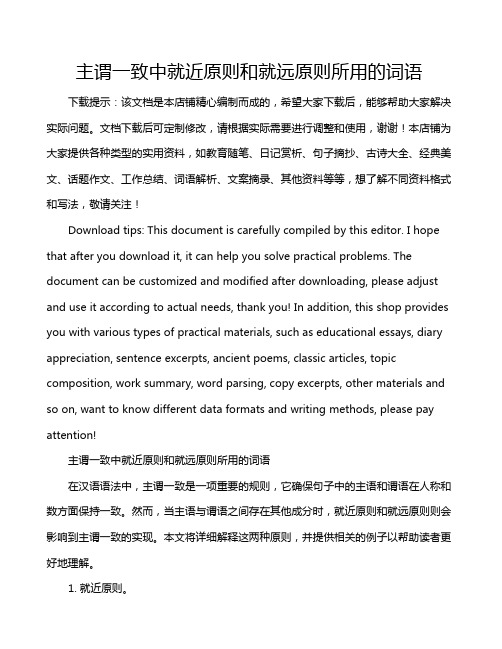
主谓一致中就近原则和就远原则所用的词语下载提示:该文档是本店铺精心编制而成的,希望大家下载后,能够帮助大家解决实际问题。
文档下载后可定制修改,请根据实际需要进行调整和使用,谢谢!本店铺为大家提供各种类型的实用资料,如教育随笔、日记赏析、句子摘抄、古诗大全、经典美文、话题作文、工作总结、词语解析、文案摘录、其他资料等等,想了解不同资料格式和写法,敬请关注!Download tips: This document is carefully compiled by this editor. I hope that after you download it, it can help you solve practical problems. The document can be customized and modified after downloading, please adjust and use it according to actual needs, thank you! In addition, this shop provides you with various types of practical materials, such as educational essays, diary appreciation, sentence excerpts, ancient poems, classic articles, topic composition, work summary, word parsing, copy excerpts, other materials and so on, want to know different data formats and writing methods, please pay attention!主谓一致中就近原则和就远原则所用的词语在汉语语法中,主谓一致是一项重要的规则,它确保句子中的主语和谓语在人称和数方面保持一致。
主谓一致和就近就远原则审批稿

主谓一致和就近就远原则YKK standardization office【 YKK5AB- YKK08- YKK2C- YKK18】主谓一致和就近就远原则就近一致原则也称“邻近原则”“就近一致原则”,即:谓语与靠近的名词、代词(有时不一定是主语)在“人称、人数”上一致。
一、在正式文体中:1.由下列词语连接的并列主语:“there be+句型;oreither...or;nor;neither...nor;whether...or;not...but;not only...but also”等。
Eg.(1)What he does or what he says does not concern me.他的行为或言谈与我无关。
(2)Neither you nor I am wrong.你和我都没错。
(3)Not you but your father is to blame.不是你,而是你的父亲该受责备。
(4)Not only you but (also) he is wrong.不仅你错了,他也错了。
2.在倒装句中,谓语可与后面第一个主语一致。
Eg.(1)In the distance was heard the clapping of hands and the shouts of the people.在远处,能听见鼓掌和人们的呼喊声。
(2)There is (are) a pen and some books on the desk.桌上有一支钢笔和几本书。
非正式文体中:有时依“就近”和“意义”一致的原则;但语法上,“no one”才是主语,谓语要改成“agrees”。
“写作中”一般要依“语法一致”原则。
总结:英语就近原则短语1.There be句型 There is a book and some pencils on the desk.=There are some pencils and a book on the desk.2.Neither...nor...Neither you nor he is right.=Neither he nor you are right.3.either...or...Either they or Jim is going to Shanghai next Saturday.=Either Jim or they are going to Shanghai next Saturday.4.not only...but also...Not only Ann but also her parents stay at home every Sunday.=Not only Ann’s parents but also she stays at home every Sunday.就远原则谓语动词与前面主语一致代表词汇:as well as;(together/along)with;Ratherthan;except;besides;but;including;in addition to;apart from例子:He rather than I is right.Nobody but two students is in the classroom.主谓一致一、当主语后面与with,as well as,but,except,like,rather than,no less than,besides,including等+名词或代词连用时,谓语动词与第一个主语保持一致。
主谓一致和就近就远原则
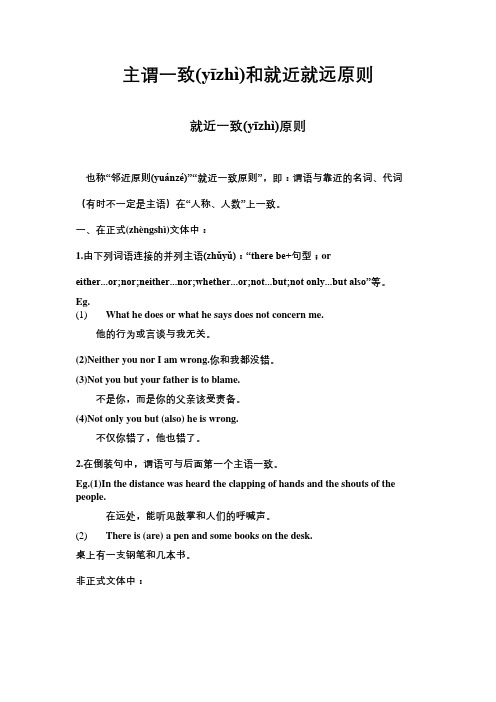
主谓一致(yīzhì)和就近就远原则就近一致(yīzhì)原则也称“邻近原则(yuánzé)”“就近一致原则”,即:谓语与靠近的名词、代词(有时不一定是主语)在“人称、人数”上一致。
一、在正式(zhèngshì)文体中:1.由下列词语连接的并列主语(zhǔyǔ):“there be+句型;oreither...or;nor;neither...nor;whether...or;not...but;not only...but also”等。
Eg.(1)What he does or what he says does not concern me.他的行为或言谈与我无关。
(2)Neither you nor I am wrong.你和我都没错。
(3)Not you but your father is to blame.不是你,而是你的父亲该受责备。
(4)Not only you but (also) he is wrong.不仅你错了,他也错了。
2.在倒装句中,谓语可与后面第一个主语一致。
Eg.(1)In the distance was heard the clapping of hands and the shouts of the people.在远处,能听见鼓掌和人们的呼喊声。
(2)There is (are) a pen and some books on the desk.桌上有一支钢笔和几本书。
非正式文体中:有时依“就近”和“意义”一致的原则;但语法上,“no one”才是主语,谓语要改成“agrees”。
“写作中”一般要依“语法一致”原则。
总结:英语就近原则短语1.There be句型 There is a book and some pencils on the desk.=There are some pencils and a book on the desk.2.Neither...nor...Neither you nor he is right.=Neither he nor you are right.3.either...or...Either they or Jim is going to Shanghai next Saturday.=Either Jim or they are going to Shanghai next Saturday.4.not only...but also...Not only Ann but also her parents stay at home every Sunday.=Not only Ann’s parents but also she stays at home every Sunday.就远原则谓语动词与前面主语一致代表(dàibiǎo)词汇:as well as;(together/along)with;Ratherthan;except;besides;but;including;in addition to;apart from例子(lì zi):He rather than I is right.Nobody but two students is in the classroom.主谓一致(yīzhì)一、当主语(zhǔyǔ)后面与with,as well as,but,except,like,rather than,no lessthan,besides,including等+名词或代词连用(liányòng)时,谓语动词与第一个主语保持一致。
英语主谓一致中就近原则和就远原则
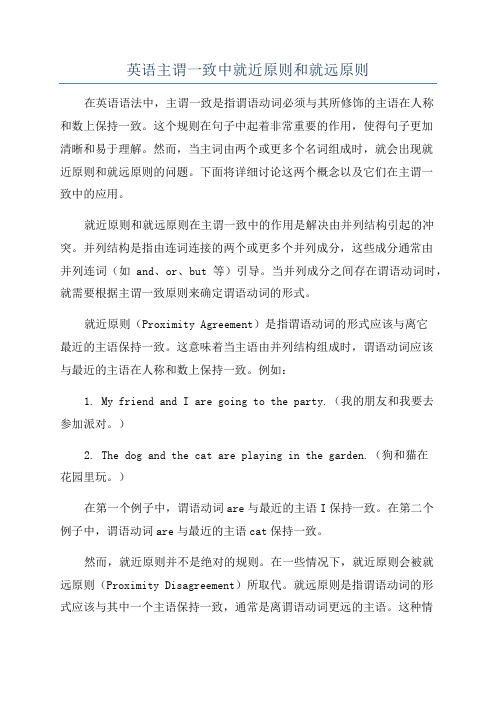
英语主谓一致中就近原则和就远原则在英语语法中,主谓一致是指谓语动词必须与其所修饰的主语在人称和数上保持一致。
这个规则在句子中起着非常重要的作用,使得句子更加清晰和易于理解。
然而,当主词由两个或更多个名词组成时,就会出现就近原则和就远原则的问题。
下面将详细讨论这两个概念以及它们在主谓一致中的应用。
就近原则和就远原则在主谓一致中的作用是解决由并列结构引起的冲突。
并列结构是指由连词连接的两个或更多个并列成分,这些成分通常由并列连词(如and、or、but等)引导。
当并列成分之间存在谓语动词时,就需要根据主谓一致原则来确定谓语动词的形式。
就近原则(Proximity Agreement)是指谓语动词的形式应该与离它最近的主语保持一致。
这意味着当主语由并列结构组成时,谓语动词应该与最近的主语在人称和数上保持一致。
例如:1. My friend and I are going to the party.(我的朋友和我要去参加派对。
)2. The dog and the cat are playing in the garden.(狗和猫在花园里玩。
)在第一个例子中,谓语动词are与最近的主语I保持一致。
在第二个例子中,谓语动词are与最近的主语cat保持一致。
然而,就近原则并不是绝对的规则。
在一些情况下,就近原则会被就远原则(Proximity Disagreement)所取代。
就远原则是指谓语动词的形式应该与其中一个主语保持一致,通常是离谓语动词更远的主语。
这种情况下,就远原则一般出现在最近的主语和谓语动词之间有插入语的情况下。
例如:1. The cat, along with the dogs, is sleeping.(猫和狗们都在睡觉。
)2. My sister, as well as her friends, is going on the trip.(我姐姐和她的朋友们都要去旅行。
)在第一个例子中,虽然最近的主语是dogs,但是由于插入语along with独立于并列结构之外,因此谓语动词is与最远的主语cat保持一致。
就远与就近原则

就远原则
当用作主语的成分后面跟有由but, except, besides, including, like, with, as well as, as much as, no less than, along with, in addition to, combined with, rather than, er with等引出的短语时,谓语动词习惯上要与这些结构前面的主语保持一致(即与比较远的那个主语保持一致)
就远与就近原则
主谓一致分为两大类:就近一致原则和意义一致原则。
就近一致原则指的是,以靠近谓语动词的,作主语的名词作为人称和数的参考标准。
意义一致原则指的是,必须分析主语属于单数或是复数,可数或是不可数,然后才能决定谓语动词的人称和数的形式。
就近一致原则
连词not only...but also/ neither...nor/ or/ either...or/ not...but
主谓一致之就近与就远一致原则教学设计
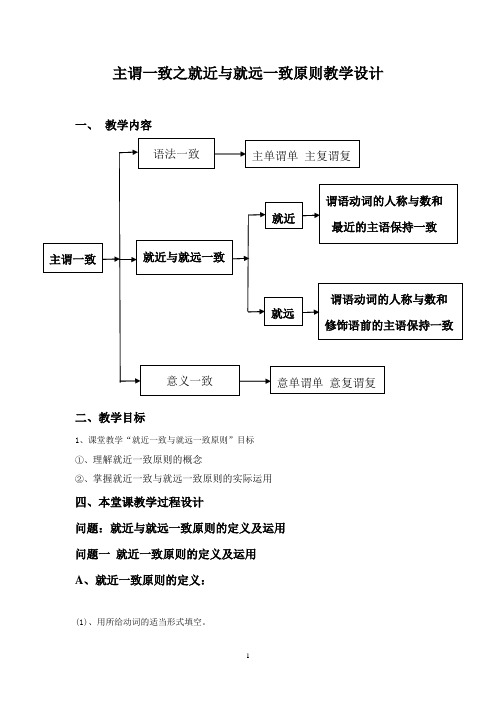
主谓一致之就近与就远一致原则教学设计一、教学内容二、教学目标1、课堂教学“就近一致与就远一致原则”目标①、理解就近一致原则的概念②、掌握就近一致与就远一致原则的实际运用四、本堂课教学过程设计问题:就近与就远一致原则的定义及运用问题一就近一致原则的定义及运用A、就近一致原则的定义:(1)、用所给动词的适当形式填空。
Group 1:1)、Here ________ a pen and two books for you.(be)2)、There __________ two apples and six bananas on the desk.(be)3)、Neither you nor I __________ wrong.(be)4)、Not only the students but also the teacher ___________ listening to the music.(enjoy)5)、Either you or your sister ___________ to wash clothes.(have)6)、Tom or you ___________ going to win.(be)设计意图:通过实例呈现就近一致原则的语法现象,学生首先通过填充谓语动词对就近一致原则的定义有了一个初步的了解,解决了这个问题就为之后的观察句子,总结就近一致原则的适用范围做好了铺垫。
师生活动:学生独立思考完成谓语动词的填空后回答。
定义总结:就近一致原则指的是谓语动词的人称和数由最靠近它的主语决定。
B、就近一致原则的运用(2)、观察以上六个句子,总结就近一致原则的适用范围。
设计意图:进一步从句子的主语和谓语两部分来归纳就近一致原则的适用范围。
师生活动:学生讨论后回答,教师指导。
运用总结:A、当用作主语的两个名词或代词由or,either...or, neither...nor, not only...but also, not...but连接时,谓语动词通常与最临近的名词或代词保持一致。
2014英语语法笔记 主谓一致

1)双the
the + adj.
一类人
the &#slivein such bad area.
The Greenslivein one of those houses.
2)牛人警察穿衣服:cattle, people, police, clothes
2014秋初二英语语法笔记
第十讲主谓一致
一、就近原则:或不仅而且,有两者都不
or, either…or
或
not only…but also
不仅…而且
there be
有
neither…nor
两者都不
例:Not only Mc Dull but alsohis motherlikeswalking in spring.
例:Thepolicearelooking for the cattle.
Thecattlehaverun away.
Thepeopleweartheir new clothes.
Theclothesaremade in China.
3)both
例:BothMc Dull and his motherarehaving lunch.
二、就远原则:除和像
except, besides, but
除
as well as, with,
along with, together with,
including
和
like
像
例:Mc Dullwithhis motheriswatching TV.
三、必单原则:
1)不定代词
someone
somebody
something
anyone
主谓一致和就近就远原则
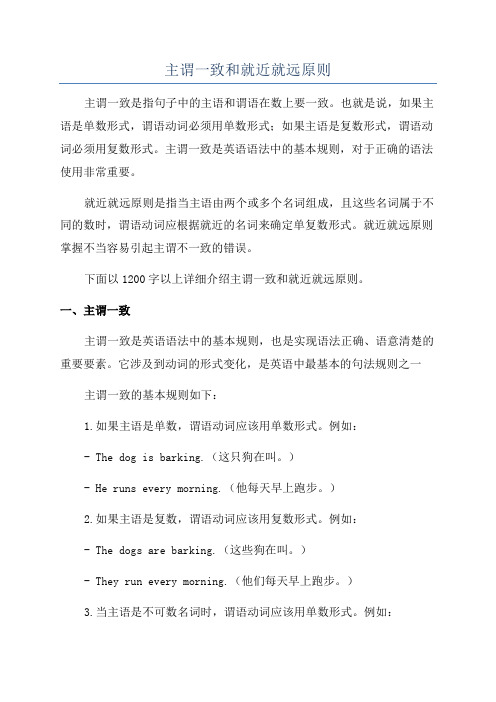
主谓一致和就近就远原则主谓一致是指句子中的主语和谓语在数上要一致。
也就是说,如果主语是单数形式,谓语动词必须用单数形式;如果主语是复数形式,谓语动词必须用复数形式。
主谓一致是英语语法中的基本规则,对于正确的语法使用非常重要。
就近就远原则是指当主语由两个或多个名词组成,且这些名词属于不同的数时,谓语动词应根据就近的名词来确定单复数形式。
就近就远原则掌握不当容易引起主谓不一致的错误。
下面以1200字以上详细介绍主谓一致和就近就远原则。
一、主谓一致主谓一致是英语语法中的基本规则,也是实现语法正确、语意清楚的重要要素。
它涉及到动词的形式变化,是英语中最基本的句法规则之一主谓一致的基本规则如下:1.如果主语是单数,谓语动词应该用单数形式。
例如:- The dog is barking.(这只狗在叫。
)- He runs every morning.(他每天早上跑步。
)2.如果主语是复数,谓语动词应该用复数形式。
例如:- The dogs are barking.(这些狗在叫。
)- They run every morning.(他们每天早上跑步。
)3.当主语是不可数名词时,谓语动词应该用单数形式。
例如:- Rice is a staple food in many countries.(大米是许多国家的主食。
)- Water covers about 71% of the Earth's surface.(水覆盖了地球表面的约71%。
)4. 当主语是由两个或多个单数名词或代词连接而成,并且以 and 连接时,谓语动词应该用复数形式。
例如:- Peter and John are playing basketball.(彼得和约翰正在打篮球。
)- Mary and her brothers are studying in the same school.(玛丽和她的兄弟们在同一所学校上学。
)5. 当主语是由两个或多个单数名词或代词连接而成,并且以 or, either...or, neither...nor等连接时,谓语动词应该与最靠近它的主语保持一致。
初中英语主谓一致和就近原则讲解及练习

初中英语主谓一致和就近原则讲解及练习Prepared on 21 November 2021英语语法——主谓一致(就近、就远原则)就近原则:也称“邻近原则”“就近一致原则”(Proximity),即:谓语与靠近的名词、代词(有时不一定是主语)在“人称、数”上一致。
在正式文体中:1.由下列词语连接的并列主语:"there be+句型; or ; either …or;nor; neither…nor;whether…or;not…but; not only…but also" ; 等。
e.g.①What he does or what he says does not concern me . 他的行为或言谈都与我无关。
②Neither you nor I am wrong . 你和我都没错。
③Not you but your father is to blame . 不是你,而是你父亲该受责备。
④Not only you but(also) he is wrong .不仅你错了,他也错了。
2. 在倒装句中:谓语可与后面第一个主语一致。
e.g.①In the distance was heard the clapping of hands and the shouts of the people . 在远处,能听见鼓掌声和人们的呼喊声。
②There is (are) a pen and some books on the desk .桌上有一支钢笔和几本书。
II. 非正式文体中:有时依“就近一致原则”,但也可依“意义一致原则”或严格地依“语法一致原则”。
e.g.Neither she nor I were there (意义一致) 我和他当时都不在那儿。
(非正式)Neither she nor I was there .(就近一致)(译文同上句)(正式)但是,如果依“就近一致原则”而与其他两项原则相矛盾时,则常常认为是不太合符规范的。
英语就近就远原则
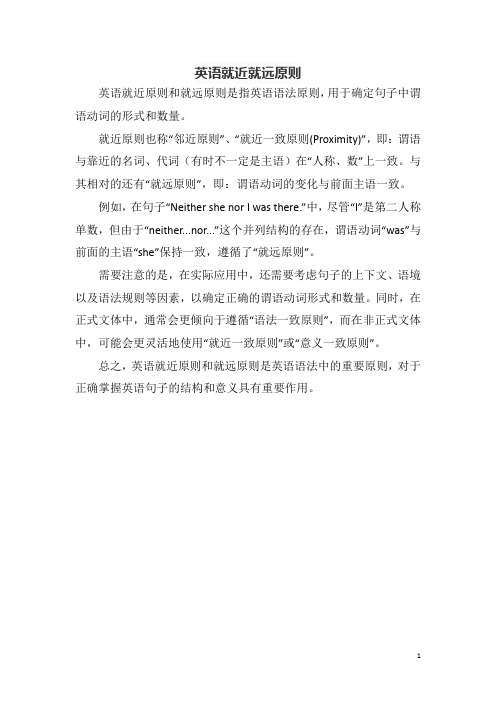
英语就近就远原则
英语就近原则和就远原则是指英语语法原则,用于确定句子中谓语动词的形式和数量。
就近原则也称“邻近原则”、“就近一致原则(Proximity)”,即:谓语与靠近的名词、代词(有时不一定是主语)在“人称、数”上一致。
与其相对的还有“就远原则”,即:谓语动词的变化与前面主语一致。
例如,在句子“Neither she nor I was there.”中,尽管“I”是第二人称单数,但由于“neither...nor...”这个并列结构的存在,谓语动词“was”与前面的主语“she”保持一致,遵循了“就远原则”。
需要注意的是,在实际应用中,还需要考虑句子的上下文、语境以及语法规则等因素,以确定正确的谓语动词形式和数量。
同时,在正式文体中,通常会更倾向于遵循“语法一致原则”,而在非正式文体中,可能会更灵活地使用“就近一致原则”或“意义一致原则”。
总之,英语就近原则和就远原则是英语语法中的重要原则,对于正确掌握英语句子的结构和意义具有重要作用。
1。
主谓一致就近原则
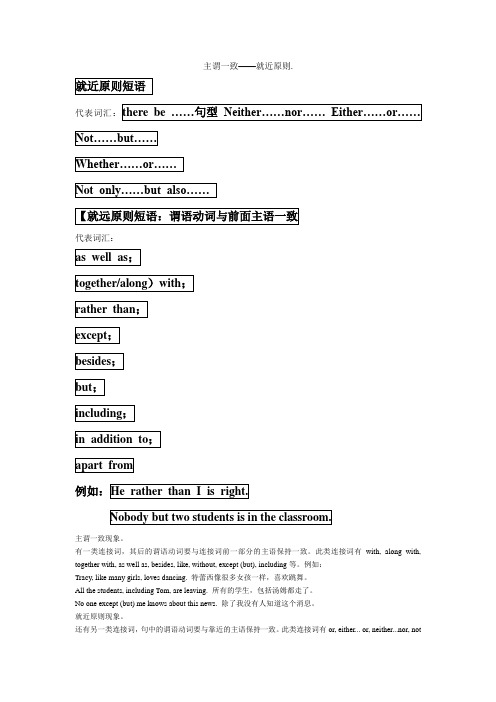
主谓一致——就近原则.代表词汇:主谓一致现象。
有一类连接词,其后的谓语动词要与连接词前一部分的主语保持一致。
此类连接词有with, along with, together with, as well as, besides, like, without, except (but), including等。
例如:Tracy, like many girls, loves dancing. 特蕾西像很多女孩一样,喜欢跳舞。
All the students, including Tom, are leaving. 所有的学生,包括汤姆都走了。
No one except (but) me knows about this news. 除了我没有人知道这个消息。
就近原则现象。
还有另一类连接词,句中的谓语动词要与靠近的主语保持一致。
此类连接词有or, either... or, neither...nor, notonly... but also等。
例如:Neither you nor I am wrong. 你和我都没错。
Not only the students but also the teacher wishes for a holiday. 不仅是学生,就连老师也期盼一个假期。
1.There be 句型There is a book and some pencils on the desk.=There are some pencils and a book on the desk.2.neither...nor... Neither you nor he is right.= Neither he nor you are right.3.either...or... Either they or Jim is going to Shanghai next Saturday.= Either Jim or they are going to shanghai next Saturday.4.not only...but also... Not only Ann but also her parents stay at home every Sunday.= Not only Ann's parents but also she stays at home every Sunday.百度词条:就近原则也称“邻近原则”“就近一致原则”(Proximity),即:谓语与靠近的名词、代词(有时不一定是主语)在“人称、数”上一致。
- 1、下载文档前请自行甄别文档内容的完整性,平台不提供额外的编辑、内容补充、找答案等附加服务。
- 2、"仅部分预览"的文档,不可在线预览部分如存在完整性等问题,可反馈申请退款(可完整预览的文档不适用该条件!)。
- 3、如文档侵犯您的权益,请联系客服反馈,我们会尽快为您处理(人工客服工作时间:9:00-18:30)。
主谓一致和就近就远原则
就近一致原则
也称“邻近原则”“就近一致原则”,即:谓语与靠近的名词、代词(有时不一定是主语)在“人称、人数”上一致。
一、在正式文体中:
1.由下列词语连接的并列主语:“therebe+句型;
oreither...or;nor;neither...nor;whether...or;not...but;notonly...but also”等。
Eg.
(1)What he does or what he says does not concern me.他的行为或言谈与我无关。
(2)Neither you nor I am wrong.你和我都没错。
(3)Not you but your father is to blame.
不是你,而是你的父亲该受责备。
(4)Not only you but (also) he is wrong.
不仅你错了,他也错了。
2.在倒装句中,谓语可与后面第一个主语一致。
Eg.(1)In the distance was heard the clapping of hands and theshouts of the people.
在远处,能听见鼓掌和人们的呼喊声。
(2)There is (are) a pen and some books on the desk.桌上有一支钢笔和几本书。
非正式文体中:
有时依“就近”和“意义”一致的原则;但语法上,“noone”才是主语,谓语要改成“agrees”。
“写作中”一般要依“语法一致”原则。
总结:英语就近原则短语
1.Therebe句型
Thereisabookandsomepencilsonthedesk.=Therearesomepencilsandabookonthedesk.
2.Neither...nor...
Neither you nor he is right.=Neither he nor you are right.
3.either...or...
Either they or Jim is going to Shanghai next Saturday.=Either Jim or they are going to Shanghai next Saturday.
4.not only...but also...
Not only Ann but also her parents stay at home every Sunday.=Notonly Ann’s parentsbut alsoshestays athome everySunday.
就远原则
谓语动词与前面主语一致
代表词汇:as well as;(together/along)with;Rather
than;except;besides;but;including;in addition to;apart from例子:He rather than I is right.
Nobody but two students is in the classroom.
主谓一致
一、当主语后面与with,aswellas,but,except,like,ratherthan,no less
than,besides,including等+名词或代词连用时,谓语动词与第一个主语保持一致。
1.Theteacher,with6girlsand8boysofherclass,___visitinga museum when the earthquake struck.
A.was
B.were
C.had been
D.would be
2.Alibrarywithfivethousandbooks___tothenationasagift.A.is offered
B.has offered
C.are offered
D.have offered
3.E-mail,as well as telephone,___an important part in dailycommunication.
A.is playing
B.have played
C.are playing
D.play
4.Nobody but Jane___the secret.
A.know
B.knows
C.have known
D.is known
5.All but one___here just now.
A.is
B.was
C.has been
D.were
二、当either...or..;neither...nor..;not only...but also..等连接并列主语时,谓语动词与靠近它的主语保持一致。
6.Either you or the headmaster___the prizes to these giftedstudents at the meeting.
A.was handing out
B.are to hand out
C.are handing out
D.is to hand out
7.Not only I but also Jane and Mary____tired of having oneexamination after another.
A.is
B.are
C.am
D.be
三、当“the only one of+复数名词+定语从句”,且关系代词在定语从句中作主语时,定语从句的谓语动词用单数形式,当“one of+复数名词+定语从句”,且关系代词在定语从句中作主语时,定语从句的谓语动词用复数形式。
8.Heistheonlyoneofthestudentswho___awinnerofscholarship for three years.
A.is
B.are
C.have been
D.has been
9.She is one of the few girls who___in the kindergarten.A.is well paid
B.are well paid
C.is paying well
D.are paying well
四、当news,means,maths,plastics,physics等在形式上是复数概念,而在意义上是单数概念的名词作主语时,谓语动词用单数形式。
10.Everypossiblemeans___topreventthepollution,buttheskyis still not clear.
A.is used
B.are used
C.has been used
D.have been used
五、当分数(百分数)+of+名词作主语时,谓语动词的数取决于of后面名词的数。
11._____ofthelandinthatdistrcit_____coveredwithtreesand
glass.
A.Two fifth;is
B.Two fifth;are
C.Two fifths;is
D.Two fifths;are
六、the number of...(...的数目)短语作主语时,谓语动词用单数形式;当a number of...(许多...)短语作主语时,谓语动词用复数形式。
12.Thenumberofpeopleinvited___fifty,butanumberofthem___absent for different reasons.
A.were;was
B.was;was
C.was;was
D.were;were
七、当“疑问词+不定式”结构作主语时,谓语动词常用单数形式。
13.When and where to build the new factory___yet.
A.is not decided
B.are not decided
C.has not decided
D.have not decided
(学习的目的是增长知识,提高能力,相信一分耕耘一分收获,努力就一定可以获得应有的回报)。
